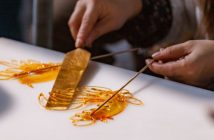Although Halloween undoubtedly dominates the month of October, it’s not the only holiday that’s being celebrated this month. Diwali, aka Deng Jie (灯节), is a festival of lights, oil lamps, sweets, and good wishes. To explain Diwali like a pro, we asked Kannika Mehrotra, a student at International School of Beijing, and one of our beloved summer interns.
The pomp and show of Diwali starts at least ten days before the actual Diwali holiday – this time period is known as the “Golden period.” During this time every household focuses on cleaning and decorating their homes with lights and other fancy items. My mom prepares a lot of sweet and savory delicacies during this golden period. We also do a lot of shopping. I remember when I was in India the markets were so packed during this time! In my house, particularly along with buying new clothes, we also buy a silver coin every year as it is believed to bring good fortune. Also, one of my favorite practices related to Diwali would be making “Rangoli” at my home entrance. Rangoli is a traditional Indian art to decorate the floor.

On the main Diwali holiday we worship Hindu gods and goddesses. We also perform a blessed ritual in the evening which is called “pooja.” This practice aims at praying to god for prosperity and wellness. We also decorate our home and surroundings with oil lamps and lights. After the pooja is done we head outside to burn firecrackers, we visit our friends and relatives for parties, and we exchange lots of sweets and love with each other.
Why is it an important holiday?
Diwali is an auspicious festival that symbolizes the victory of light over darkness and good over evil. It’s an important holiday for spiritual enlightenment for all the Hindus over the world. In fact, it’s a festival of inclusivity. In a diverse country like India, this festival of brightness and positivity is celebrated by people of different faiths, no matter whether they identify themselves as Hindu or not. Today, the drums of Diwali resonate in different countries all over the world. Essentially, according to Hindu mythology Diwali is celebrated because on this day King Ram and his brother Laxman returned from a 14-year exile rescuing Ram’s wife Sita from a demon called “Ravan” and bringing her back to their kingdom Ayodhya. The victory of Ram, Laxman, and Sita over the demon Ravan is symbolic of the triumph of good over evil. This victory of truth and justice is celebrated every year by propagating the message of brightness over darkness. This is the reason why oil clay lamps are lit during Diwali. The bright light of the lamps symbolizes positivity and victory of light over darkness.

What’s your favorite Diwali memory growing up?
My favorite memory as a kid would be going out for Diwali shopping, lighting crackers, visiting my friends and family, dressing up in traditional attire, and obviously eating a lot of good food!! I remember how as a kid I was always so excited to receive Diwali gifts and sweets. In our community, for about a week we used to visit friends and relatives for Diwali gatherings. The Diwali sweets almost took one month to get finished because during this festival everyone’s home was loaded with sweets and savories!!
What’s your plan for Diwali this year?
This year Diwali is on Oct 24, and sadly it’s a working day! But still, I will be celebrating Diwali this weekend with the Indian community. Even though it’s a working day this Diwali, still I am very excited to celebrate Diwali with my international friends. We might be celebrating Diwali together by having a sumptuous Indian feast at an Indian restaurant in Beijing.

How would you explain Diwali to a 5-year-old kid who has never heard of it?
The go-to definition for Diwali would be good food, lights, firecrackers, sweets, gifts, friends, family, and a lot of FUNNNN!
Want to take part in the celebration in Beijing this year? Daastan sounds like they’re putting on quite a show for Diwali, but unfortunately for most of us they’re already completely sold out of seats! However, Indian Kitchen will be having an authentic South Indian Banana Leaf Feast with a great buffet spread and performances.

Find it:
2/F, 2 Sanlitun Beixiaojie (opposite Korean embassy), Chaoyang District
朝阳区三里屯北小街2号2楼
Tel: 6462 7255
KEEP READING: That’s Not Bing! It’s Roti! When Indian and Chinese Food Unite




